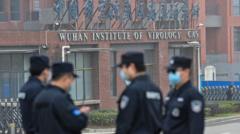In a surprising update, reports from Die Zeit and Sueddeutscher Zeitung have unveiled that Germany's BND believed there was a significant chance, estimated between 80-90%, that the coronavirus pandemic originated from an accidental leak in a Chinese laboratory. This assessment, operationally titled Project Saaremaa, dates back to 2020 and was allegedly rooted in a study of the Wuhan Institute of Virology’s safety and experimental protocols.
Germany's Intelligence Agency Once Estimated 90% Chance of Covid-19 Lab Leak

Germany's Intelligence Agency Once Estimated 90% Chance of Covid-19 Lab Leak
Recent revelations from German media suggest that the BND, Germany's foreign intelligence service, estimated an 80-90% likelihood that Covid-19 leaked from a Chinese laboratory, leading to ongoing debates around the virus's origins.
The German intelligence agency speculated that the lab had been conducting experiments that enhanced the transmissibility of viruses, raising safety concerns. While the report was intended for internal purposes—including sharing with the CIA—it had never been made public before now. China's government, however, maintains that the true origins of the virus should be determined through scientific means rather than political discourse. Beijing has previously stated that investigations by worldwide health experts found the lab-leak theory to be "extremely unlikely."
This discussion surrounding the pursuit of Covid-19’s origins includes more than just the German perspective. The United States' CIA has shifted its stance as recent evaluations imply that a lab-related origin is now considered more plausible than a natural occurrence. Despite ongoing debates and various expert opinions, consensus on the virus's true origins remains elusive, with rigorous investigations taking place since the pandemic commenced.
While the WHO conducted an investigation into the origins of Covid-19 in early 2021 that dismissed the lab-leak theory, criticisms have surfaced about the thoroughness of that inquiry, arguing it failed to genuinely evaluate key aspects of laboratory safety intricacies. The natural origin hypothesis, which suggests Covid-19 emerged through animal transmission, is still widely accepted, yet as more evidence unfolds, doubts regarding the absence of a matching virus in other species continue to arise, fueling ongoing speculation and inquiries into the pandemic's origins.
This discussion surrounding the pursuit of Covid-19’s origins includes more than just the German perspective. The United States' CIA has shifted its stance as recent evaluations imply that a lab-related origin is now considered more plausible than a natural occurrence. Despite ongoing debates and various expert opinions, consensus on the virus's true origins remains elusive, with rigorous investigations taking place since the pandemic commenced.
While the WHO conducted an investigation into the origins of Covid-19 in early 2021 that dismissed the lab-leak theory, criticisms have surfaced about the thoroughness of that inquiry, arguing it failed to genuinely evaluate key aspects of laboratory safety intricacies. The natural origin hypothesis, which suggests Covid-19 emerged through animal transmission, is still widely accepted, yet as more evidence unfolds, doubts regarding the absence of a matching virus in other species continue to arise, fueling ongoing speculation and inquiries into the pandemic's origins.



















